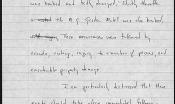author
Alice Pettway
Alice Pettway is the author of four collections of poetry: Dawn Chorus (2023), Station Lights (2021), Moth (2019), and The Time of Hunger (2017). Her work, which spans poetry, non-fiction, and fiction, has appeared in AGNI, Learning for Justice magazine, Rattle, The Progressive, The Southern Review, The Threepenny Review and many other respected publications. She is a former Chulitna Artist Fellow and Art Omi: Writers resident. Currently, Pettway lives and writes near Seattle, Washington.


